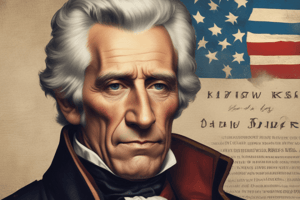Podcast
Questions and Answers
From which group did Andrew Jackson receive the most support in the election of 1828?
From which group did Andrew Jackson receive the most support in the election of 1828?
common people
What political party was formed by supporters of Andrew Jackson following the election of 1824?
What political party was formed by supporters of Andrew Jackson following the election of 1824?
Democratic
What name was given to President Jackson's practice of rewarding political supporters with government jobs?
What name was given to President Jackson's practice of rewarding political supporters with government jobs?
the spoils system
What caused the nullification crisis?
What caused the nullification crisis?
During the nullification crisis, what was really being tested?
During the nullification crisis, what was really being tested?
Who challenged President Jackson's stance on the Bank of the United States?
Who challenged President Jackson's stance on the Bank of the United States?
Why did President Jackson want to destroy the Bank of the United States?
Why did President Jackson want to destroy the Bank of the United States?
What did President Jackson support instead of a large national bank?
What did President Jackson support instead of a large national bank?
What Supreme Court decision did President Jackson ignore?
What Supreme Court decision did President Jackson ignore?
Why did many whites call the Creek, Cherokee, Chickasaw, Choctaw, and Seminole groups the 'Five Civilized Tribes'?
Why did many whites call the Creek, Cherokee, Chickasaw, Choctaw, and Seminole groups the 'Five Civilized Tribes'?
Why did U.S. laws support the removal of American Indians from their homelands?
Why did U.S. laws support the removal of American Indians from their homelands?
How did the Supreme Court interpret the Indian Removal Act?
How did the Supreme Court interpret the Indian Removal Act?
What was the intention of the Indian Removal Act of 1830?
What was the intention of the Indian Removal Act of 1830?
What was 'The Trail of Tears'?
What was 'The Trail of Tears'?
What group was affected most negatively by the administration of President Jackson?
What group was affected most negatively by the administration of President Jackson?
Flashcards are hidden until you start studying
Study Notes
Andrew Jackson and Political Dynamics
-
Andrew Jackson garnered substantial support from common people during the election of 1828, reflecting a shift towards increased democratic participation in politics.
-
The Democratic Party emerged from the political factions supporting Jackson after the contentious election of 1824, marking a significant realignment in American political landscape.
Practices and Policies
-
The spoils system was a political practice employed by President Jackson, rewarding loyal supporters with government positions, fostering a culture of patronage in politics.
-
Tariffs are taxes imposed on imported goods, which became a contentious issue during Jackson's presidency, particularly affecting Southern states.
Nullification Crisis
-
Southern opposition to tariffs gave rise to the nullification crisis, where states challenged federal authority over economic regulations.
-
The crisis tested the rights of states to invalidate federal laws, highlighting the tensions between state sovereignty and federal power during Jackson's presidency.
Banking and Economy
-
Henry Clay was a key opponent of Jackson's vision, particularly in his challenge against Jackson's actions regarding the Bank of the United States.
-
President Jackson believed the Bank favored wealthy elites over farmers and laborers, prompting his desire to dismantle the institution for a more equitable financial system.
-
Jackson proposed supporting state banks instead of maintaining a centralized national bank, advocating for localized control over financial matters.
-
Jackson chose to ignore the Supreme Court ruling that deemed the Bank of the United States constitutional, showcasing his defiance of judicial authority.
Indigenous Relations
-
The "Five Civilized Tribes" (Creek, Cherokee, Chickasaw, Choctaw, and Seminole) were labeled as such by many whites because they adopted Euro-American cultural practices and lifestyles.
-
U.S. laws facilitated the removal of American Indians from their homelands to promote westward agricultural expansion, leading to significant territorial and cultural disruptions.
-
The Supreme Court interpreted the Indian Removal Act as allowing tribes to remain on their lands under certain conditions, yet this was largely ignored in practice.
-
The Indian Removal Act of 1830 aimed to negotiate treaties for the relocation of tribes from eastern territories to lands in the Great Plains, fundamentally altering the landscape of Native American existence.
Consequences of Policies
-
The "Trail of Tears" refers to the harrowing forced relocation of the Cherokee people from Georgia, resulting in significant loss of life and trauma.
-
American Indians were adversely affected by Jackson's administration policies, experiencing dispossession, forced migration, and cultural upheaval.
Studying That Suits You
Use AI to generate personalized quizzes and flashcards to suit your learning preferences.




